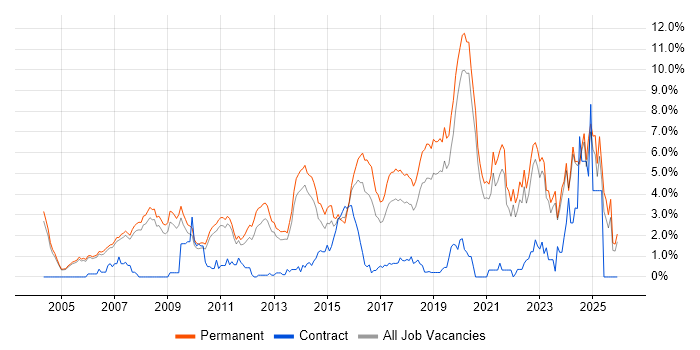Master's Degree
Oxfordshire > Oxford
The table below provides summary statistics for permanent job vacancies advertised in Oxford with a requirement for Master's Degree qualifications. It includes a benchmarking guide to the salaries offered over the 6 months leading up to 13 May 2025, comparing them to the same period in the previous two years.
| 6 months to 13 May 2025 |
Same period 2024 | Same period 2023 | |
|---|---|---|---|
| Rank | 18 | 12 | 17 |
| Rank change year-on-year | -6 | +5 | +22 |
| Permanent jobs citing Master's Degree | 19 | 59 | 36 |
| As % of all permanent jobs advertised in Oxford | 8.26% | 9.08% | 7.91% |
| As % of the Qualifications category | 29.69% | 29.06% | 26.47% |
| Number of salaries quoted | 5 | 50 | 11 |
| 10th Percentile | £51,000 | - | - |
| 25th Percentile | £71,250 | £41,250 | £41,250 |
| Median annual salary (50th Percentile) | £77,500 | £55,000 | £42,500 |
| Median % change year-on-year | +40.91% | +29.41% | -44.26% |
| 75th Percentile | £83,750 | £72,500 | £48,125 |
| 90th Percentile | £120,500 | £82,500 | £52,500 |
| Oxfordshire median annual salary | £40,000 | £52,500 | £37,500 |
| % change year-on-year | -23.81% | +40.00% | -27.18% |
All Academic and Professional Certifications
Oxford
Master's Degree falls under the Academic Qualifications and Professional Certifications category. For comparison with the information above, the following table provides summary statistics for all permanent job vacancies requiring academic qualifications or professional certifications in Oxford.
| Permanent vacancies requiring academic qualifications or professional certifications | 64 | 203 | 136 |
| As % of all permanent jobs advertised in Oxford | 27.83% | 31.23% | 29.89% |
| Number of salaries quoted | 17 | 131 | 85 |
| 10th Percentile | £36,000 | £32,750 | £24,000 |
| 25th Percentile | £37,500 | £41,250 | £32,500 |
| Median annual salary (50th Percentile) | £62,500 | £52,500 | £47,610 |
| Median % change year-on-year | +19.05% | +10.27% | +0.23% |
| 75th Percentile | £77,500 | £65,625 | £65,000 |
| 90th Percentile | £96,250 | £73,750 | £80,500 |
| Oxfordshire median annual salary | £50,000 | £47,500 | £47,500 |
| % change year-on-year | +5.26% | - | -7.77% |
Master's Degree
Job Vacancy Trend in Oxford
Job postings citing Master's Degree as a proportion of all IT jobs advertised in Oxford.

Master's Degree
Salary Trend in Oxford
3-month moving average salary quoted in jobs citing Master's Degree in Oxford.
Master's Degree
Salary Histogram in Oxford
Salary distribution for jobs citing Master's Degree in Oxford over the 6 months to 13 May 2025.
Master's Degree
Co-occurring Skills and Capabilities in Oxford by Category
The follow tables expand on the table above by listing co-occurrences grouped by category. The same employment type, locality and period is covered with up to 20 co-occurrences shown in each of the following categories:
